FOLLOW US ON TWITTER @SaveOurBucks
George Steinbrenner, Jerry Jones, Mark Cuban and Al Davis.
Collectively that may be the Mt. Rushmore of “hands-on” owners in professional sports.
Those four represent owners who are (or were) the face of their franchise. They took an open and active role in all aspects of franchise operation, right down to wanting to be involved in the calling of actual plays on the field.
In Part I last week, we examined the track record of Bucks’ General Manager John Hammond, and the fact that many of his player personnel moves tended to look like losers very quickly after they were made. Hammond apparently agrees with our take, since said players acquired or signed to a new contract have been so often traded by Hammond shortly thereafter. However, the question that has dominated the Bucks fan base the past two decades is exactly how responsible is the team’s general manager for the overall record and talent base of the team at any given moment?
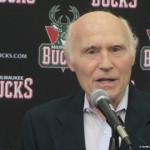 Senator Herb Kohl has a long-standing reputation as a “hands-on” owner, similar to the NFL’s Jerry Jones and Al Davis, MLB’s George Steinbrenner, and the NBA’s Mark Cuban. While their respective franchises have had varying degrees of success, the fingerprints of their involvement in the management of their teams are obvious, often to the point of detriment. This article will explore how Senator Kohl’s reputation for this first came about, illustrate some of the historical instances of “meddling” and finally discuss how Kohl, much like his college roommate Bud Selig, has an opportunity for civic immortality if he is able to successfully navigate the Bucks to a long-term future in Milwaukee.
Senator Herb Kohl has a long-standing reputation as a “hands-on” owner, similar to the NFL’s Jerry Jones and Al Davis, MLB’s George Steinbrenner, and the NBA’s Mark Cuban. While their respective franchises have had varying degrees of success, the fingerprints of their involvement in the management of their teams are obvious, often to the point of detriment. This article will explore how Senator Kohl’s reputation for this first came about, illustrate some of the historical instances of “meddling” and finally discuss how Kohl, much like his college roommate Bud Selig, has an opportunity for civic immortality if he is able to successfully navigate the Bucks to a long-term future in Milwaukee.
The Origins of “Meddling”
Senator Herb Kohl purchased the Bucks in March of 1985 from former Bucks owner Jim Fitzgerald. He walked into a situation with a team that at the time was a perennial title contender, with talent that had been acquired and developed by former coach Don Nelson and former GM Wayne Embry. Nelson in particular had been used to having a free reign in organizational operations. Kohl was the ultimate fan, a person who truly loved the Bucks and wanted to participate in their success.
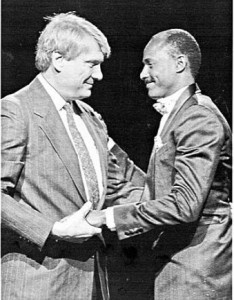
Don Nelson & Sidney Moncrief
During their first 18 months together the relationship started to break down as Kohl began to become active in player personnel matters. This rankled Nelson, who was used to significant autonomy. Kohl also started to question Nelson’s off-court activities, mainly his proclivity for having a good time at prominent local watering holes. Milwaukee is a small town where everyone knows everyone downtown, and Kohl wondered if Nelson was presenting a professional enough face of the franchise during off-hours.
The differences between the two men came to a head in May of 1987, as the Bucks took on Boston in the conference semi-finals. The Bucks heartbreakingly lost that series 4 games to 3, and it was during that series that Nelson went public with his frustrations. The excerpt below from a New York Daily News story at the time describes Nelson’s take on things.
“Nelson, who is in his 11th season with Milwaukee, might have to savor the memories. He might have coached his last home game for the Bucks.
Nelson and Milwaukee owner Herb Kohl have been at philosophical odds for almost a year, and Nelson finally admitted that the chances of him returning next season are “very, very low.”
Nelson, who enjoyed a strong relationship with former owner Jim Fitzgerald, also is the Bucks’ vice president of basketball operations, and he generally is credited with building the club into a contender through intelligent, well-thought-out player personnel decisions. He drafted Marques Johnson, Sidney Moncrief and Paul Pressey. He was able to acquire established stars such as Bob Lanier, Cummings and Jack Sikma through trades.
“I feel that I am the Milwaukee Bucks,” Nelson said.
In many ways, that might be true. But there has been growing speculation that the Sikma trade has led to the falling-out between Nelson and Kohl. The deal cost the Bucks center Alton Lister and first-round draft picks in 1987 and 1989.
Nelson and Kohl come from different worlds. Nelson is a Midwestern farm boy who wears fish ties and taped sneakers on game day. Kohl is a sophisticated Harvard Business School graduate who has taken a more active role in the running of the franchise since purchasing the team in March 1985. Their personalities were bound to clash.
“The family togetherness that’s been a part of this organization, I see it changing,” Nelson said. “Now it’s just in the locker room. It’s OK. That’s the way some teams run.
“It’s run more like a business now than a family. Herb is a good businessman. But I’m from the old school and I have trouble changing and adapting to that kind of philosophy.
“I’ve been an athlete and been involved in basketball for 25 years. I understand both sides of it. But I know the best way to run an organization is the way I’ve run this team and the way Boston runs theirs.“
We bolded the key phrase from the article above — “I feel I am the Milwaukee Bucks.” The media and City ran with that phrase, with the “I feel” modifier used by Nelson quickly being tossed aside. The statement by Nelson was the talk of the town, and was Nelson’s way of issuing a public ultimatum to Kohl, that he needed to retain full control of basketball operations or he would leave the organization (which he did a few weeks later).
In subsequent interviews, Nelson regretted his utterance of that statement, but the damage was done. At the time, the local fan base was somewhat split on the matter. Many fans supported new owner Kohl, and there was a sense of frustration among the fan base that Nelson had not been able to get the Bucks an NBA title during their prior decade of success. With a competent assistant coach on the bench ready to step up (Del Harris), it seemed like a good time for the Bucks and Nelson to part ways and for the organization to start fresh.
As a side note, ironically, the Nelson/Kohl duo were oh so close to securing a title for Milwaukee but were thwarted by former Bucks owner Jim Fitzgerald. Shortly after purchasing the team, Kohl provided Nelson with financial resources he didn’t have under Fitzgerald. On June 15, 1985, Kohl gave the green light on signing restricted free agent center Joe Barry Carroll to a lucrative offer sheet. While somewhat of an underachiever, Carroll was only 27 and entering his prime, with NBA career averages of 20 points and 8 rebounds per game. Carroll had played the prior year in Italy due to a contract dispute with his NBA team, the Golden State Warriors. Warriors owner, Franklin Mieuli was in financial distress and was not in position to match the Bucks offer. It looked like a certainty that the Bucks would obtain the low post center they needed to move past Boston and Philadelphia, and garner a trip to the NBA Finals. In a sad twist of fate, former Bucks owner Jim Fitzgerald used his Bucks sale proceeds to loan Mieuli the money needed to match the offer sheet, and in the process garner a purchase option in the team. It gave Fitzgerald the entry he needed to later purchase the Warriors; and prevented Kohl and Nelson from acquiring the center they needed to win a title.
Kohl’s Input and The Front Office Structure
After the falling out with Nelson, Kohl quickly established himself around the league as a challenging person to work for. Over the years former employees of the team have made it known that Kohl likes to put his stamp on the team, whether it is with player acquisitions or even the offensive scheme the team runs. This BrewHoop article from 2008 discusses a Gery Woelfel piece that speculated on Kohl’s involvement in team matters:
“Several players and other Bucks’ personnel contend it wasn’t Krystkowiak’s decision to abandon the triangle. In their minds, he was instructed to change the offense and that the mandate came from Bucks owner Herb Kohl.
In hindsight, management’s bungling of Charlie Bell’s contract negotiations over the summer had an adverse effect that snowballed over into the winter. Instead of immediately giving Bell an offer that was commensurate with his quality of play from last season, Bucks owner Herb Kohl and his negotiating team — which includes Ron Walter, the vice president-alternative governor, and Mike Burr, the chief financial officer — dragged its feet on a contract that should have been finalized relatively quickly…
But this wasn’t the first time the Bucks’ negotiating team has rankled someone over the years. I’ve had discussions with several former Bucks general managers, coaches and agents and they revealed their frustrations in how contractual matters were handled.
According to several NBA execs, the Bucks are believed to be one of only two teams in the NBA that negotiate trades, contracts, etc. by committee. The other is the Los Angeles Clippers. Need more be said?“
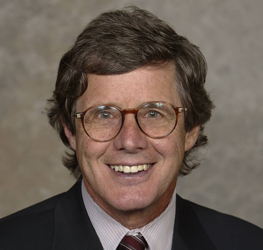
Ron Walter
We’ve talked in the past about the dysfunctional front office structure the team employs. Kohl has a number of long-time Executive Vice Presidents who act as somewhat of a watchdog over moves made by the team’s General Manager and coaching staff. Former coaches and general managers have complained that they not only have to get their proposed moves approved by Kohl, but they also have to navigate his key aides, Ron Walter, John Steinmiller and Mike Burr. Those three collectively are in charge of key facets of the business side of the team. They are fiercely loyal to Kohl, and he to them. If the long-time aides aren’t in favor of a move, they let their feelings be known to Kohl. This dynamic has made the job of Bucks general manager extremely problematic at times.
“I’m Not Mark Cuban”
After Larry Harris was let go in March of 2008, Kohl held a press conference where he discussed his involvement in the team, and where he steadfastly denied meddling in the work of the General Manager.
“MILWAUKEE — With Larry Harris out as general manager of the Milwaukee Bucks, Sen. Herb Kohl now has to prove to the next candidate that he’s not a meddling owner.
“I’m not Mark Cuban,” Kohl quipped of the Dallas Mavericks’ billionaire owner who routinely makes headlines. “I honestly believe that I’m not a meddling type of a manager, whether it be in basketball or whether it was in food stores or department stores or as a senator.“
As a professional sports owner, Kohl has every right to be significantly involved in the operation of his team. Our NBA example, Mark Cuban has been known to micro-manage every aspect of the Dallas Mavericks operation, and the end result has been a highly competitive team that has made two Finals appearances and won one title during his thirteen years of ownership. The challenge with Kohl’s involvement is that the results have not been what he or the fan base would like. So the question is why hasn’t the team prospered under Kohl’s ownership tenure? We believe there are a few reasons for this.
1. Kohl becomes too emotionally involved in certain situations
We spoke with a key Kohl confidante and he shared with us that “Herb is extremely passionate about the team, but he’s too emotional. He runs hot and cold with his players, coaches and general managers.” This person went on to say that Kohl will fall in love with certain players, blinding him to their faults. As an example of this, there were a number of instances in the 1996-1999 period where the Bucks had an opportunity to trade Glenn Robinson for player packages that might have turned out to be extremely good for the team, but Kohl had a strong personal relationship with Robinson and did not allow these proposed trades to go through.
We may have also seen this dynamic in action two weeks ago, when NBA scribe Alex Kennedy reported that the Bucks were not going to be trading Ersan Ilyasova.
“The Milwaukee Bucks have been receiving calls about Ersan Ilyasova recently, but the team is unlikely to part ways with him unless they receive an offer they can’t refuse, according to league sources. Milwaukee’s asking price on Ilyasova has been incredibly high, and sources say it’s because owner Herb Kohl is a huge fan of Ilyasova and believes that he can be a star player in the NBA. Even though this doesn’t line up with what others in the organization think and is probably inaccurate, it’s unlikely that Kohl’s favorite player gets dealt.“
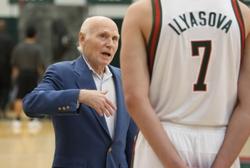
Kohl with Ilyasova at Bucks practice
In fairness to Kohl, the blurb above could have originated from a frustrated Ilyasova, his agent or from a rival team that had hoped to steal away Ilyasova in a lopsided deal. That said, given the past history of Kohl and his personal relationships with Bucks players the story seems to ring true. We just wonder if the information passed on to Kennedy came from someone in the Bucks front office. Clearly the bit about Kohl thinking Ersan can be a star in this league is from someone who wanted to impeach Kohl’s player evaluation skills. You might not find one person around the NBA or in the Milwaukee fan base who thinks Ilyasova still has a chance to be a star in the league.
2. Kohl’s involvement and the front office structure make it difficult for the team to hire top tier coaches and General Managers
Whenever the Bucks have a coaching or general manager vacancy, you’ll see a number of candidates who the Bucks would like to hire linked to the position. However normally those tier-one and tier-two candidates take themselves out of the running, as they do not believe themselves equipped to deal with the Bucks operational structure in place with Kohl and his long-time aides.
The Bucks’ don’t do themselves any favors in this regard. They have made a number of clumsy and erratic decisions as it relates to how they treat coaches and GM’s. In May of 2005 it was known within the organization that Kohl’s preference was to bring in a new coach rather than retain Terry Porter for another year. However rather than fire Porter outright, the team elected to make it hard on Porter by not retaining his top two assistants in the hope it might force Porter to quit, saving the team from the messy job of firing him. After Porter did not quit, he and then General Manager Larry Harris held their infamous press conference where Harris re-affirmed Porter as the coach for the following season, noting that the two would “sink or swim” together. Six-weeks later Porter was fired after a change in circumstances in which the Bucks not only won the 2005 NBA draft lottery, but also apparently had an opportunity to hire Doug Collins. As the story went Collins was going to join the Bucks, but would only do so if Porter was first fired so that Porter’s firing would not be tagged to Collins. According to sources, Collins then backed out after Porter was fired. The team tried to then hire tier-two candidate Flip Saunders, but he too backed out, leaving third option Terry Stotts.
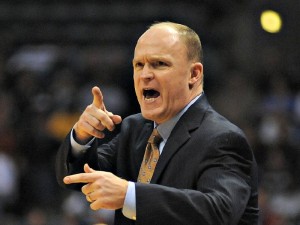
Scott Skiles
More of this dysfunction played out at the end of the 2011-12 season. That May, Scott Skiles cleaned out his office and told confidantes that he was through coaching the Bucks. The belief was the Bucks would fire him for this insubordination and Skiles could free himself of the team, while at the same time collecting from the Bucks on the last year of his contract. We were told that Kohl then intervened and kept (or forced) Skiles back on-board as coach for the 2012-13 season. Obviously the forced marriage of Skiles and the Bucks for the 2012-13 season ended up being problematic, as the Bucks were later forced to fire Skiles in mid-season.
While we’ve cited some recent examples from the past decade, challenges with hiring qualified candidates goes back a number of years. In April of 1997 the team let go of Mike Dunleavy as General Manager, with the presumption that they would hire a high profile replacement, going hard after Glenn “Doc” Rivers, Gary St. Jean and Wayne Embry among many others. They all declined the Bucks overtures. As the summer went on, Assistant Coach Bob Weinhauer was named interim GM to handle the June draft and subsequent free agency period. Finally in late July of that year, Weinhauer was named the permanent GM, after the Bucks were not able to hire anyone they perceived to be an upgrade. Ironically, the man the team didn’t want, Weinhauer, made perhaps the best Bucks trade in the last two decades when he sent out soon-to-decline Vin Baker in exchange for Terrell Brandon, Tyrone Hill and a first round draft pick.
Whether they are pursuing a new coach or a General Manager, it is widely known in NBA circles that working for the Bucks is extremely difficult given the active nature of Senator Kohl and his long-time aides.
3. Bucks’ General Managers do not have the power to make deals
Most professional sports General Managers have to run their proposed trades past ownership. This is a well-known and accepted practice. So in that regard the fact Senator Kohl approves all Bucks trades isn’t out of the norm. Given the large dollar investment with many player contracts the owner should have an opportunity for a final sign-off.
That said, the situation in Milwaukee appears to be on the extreme range of of the scale. There are countless situations where a Bucks General Manager has negotiated a trade, but before it can be consummated the process is slowed down to allow Kohl to step in and evaluate the deal. Even the low-level trade of Gary Neal two weeks ago had to await Kohl’s involvement:
As ESPN reported this AM, Bobcats trying to push through Sessions-for-Gary Neal deal. But Bucks owner Herb Kohl has not yet approved trade
— Marc Stein (@ESPNSteinLine) February 20, 2014
A difficulty that Bucks General Managers have had is that Kohl has many times at the last minute vetoed deals they had in place, neutering the power of the General Manager and sometimes resulting in the team not making a trade beneficial to the organization. It also prevents the Bucks’ GM from being able to strike quickly on a deal when the other team might concede a key asset in an emotional moment of weakness.
Former Bucks GM Larry Harris had his share of poor moves on his resume, hence why he was let go six years ago. However, Harris also had at least three high profile moves vetoed by Kohl that would have perhaps kept Harris employed longer had they been allowed to go through.
In June of 2006, it was well known that the Bucks were going to trade center Jamaal Magloire in order to free up playing time for Andrew Bogut. According to our sources Harris had in place a deal with the Utah Jazz, that would have sent out Magloire and Mo Williams for Carlos Boozer and the Jazz’s first round pick (#14 overall); however Kohl had questions about Boozer’s character and the high dollar amount remaining in Boozer’s contract.
In June of 2007, according to our sources Harris had a deal lined up that would have sent the Bucks first round pick (#6 overall) along with Bobby Simmons to the Phoenix Suns in exchange for all-star forward Shawn Marion. That trade was also vetoed by Kohl, as the front office was concerned they wouldn’t be able to retain Marion a year later when he would become a free agent.
In February of 2008 Kohl vetoed a trade that would have sent the Bucks’ three worst contracts out the door (Bobby Simmons, Dan Gadzuric and Charlie Bell) for Zach Randolph.
In retrospect it is hard to know whether any of those trades would have changed the trajectory of the team and made them a consistent winner. We can see strong arguments to avoiding Boozer and Randolph, and a concern on being able to retain Marion for the long-term. That said, fans are always left to wonder how a Bucks GM, a person specifically hired to evaluate basketball talent and assemble a winning team, would perform if they had more latitude with personnel decisions. This is why some believe it unfair to lay the blame for the Bucks’ poor performance entirely at the feet of John Hammond. In January of 2009, Hammond had in place a trade that would have sent Ramon Sessions and Joe Alexander to the Memphis Grizzlies in exchange for Mike Conley Jr. Kohl vetoed that trade as well, partly out of his belief that Sessions might become an all-star point guard.
Had Hammond been allowed to make that trade the Bucks perhaps would have avoided the years long search for a top tier point guard that ensued, and continues today. Five-years later Conley is an All-Star, while Sessions has settled in as a journeyman and Jennings appears to be headed for the same career outcome.
4. The Bucks General Manager (and Coach) is forced to serve two masters
John Hammond has been fond of using that quote often over the past year. His point behind it is that Senator Kohl not only wants a team that is competitive now, but also has young talent coming up behind the veterans. As the late Billy Martin told former Yankees owner George Steinbrenner, you can either win or develop young players, but you can’t do both at the same time. Unfortunately the Bucks have been under orders to do both the past decade.
Larry Sanders emerged at center last year after finally being given playing time and opportunity. He may have emerged earlier had the team and head coach Scott Skiles not being trying to make lemonade out of the failed Drew Gooden acquisition by playing Gooden at center so extensively down the stretch of the 2011-12 season in a bid to obtain the 8th playoff seed in the East.
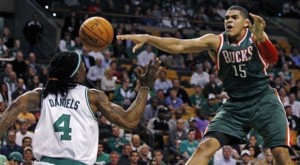
Tobias Harris & Marquis Daniels : the irony.
Tobias Harris led the Bucks to victory on opening night in Boston at the outset of the 2012-13 season but then saw little playing time afterwards, as coach Scott Skiles felt his best chance to win games was to take advantage of the dependability that veterans Luc Richard Mbah a Moute and Marquis Daniels provided at the forward spot. Given regular minutes in Orlando Harris has thrived. Whether he eventually becomes an impact player remains to be seen, but he never got the chance to develop in Milwaukee, only one year removed from being the Bucks’ first-round pick.
This season, John Henson and Nate Wolters have seen their playing time go up and down as veterans such as Luke Ridnour, Gary Neal, ZaZa Pachulia and Ersan Ilyasova have received extensive minutes. It is with that backdrop that we were not sure exactly how beneficial the trade for Ramon Sessions and Jeff Adrien will be, since both players might take developmental minutes from Henson, Wolters, and Miroslav Radulijca. If there ever were a season where the Bucks could afford to give young players extensive minutes to experiment with things the few remaining games of the 2013-14 season would be it. In five games so far with Milwaukee, Sessions (age 27) is averaging 25 minutes per game and Adrien (age 28) is averaging 19.5 minutes per game. You can draw your own conclusions on whether you think the Neal trade will open up a roster spot next season for a rookie and save the Bucks payroll dollars, or whether the Bucks have simply obtained two dependable journeymen veterans who will play meaningful minutes this year and next.
The Absence of Luck
While Kohl has not been successful in his tenure as Bucks owner, he’s also not had the benefit of much luck. As veteran NBA writer Sam Smith wrote over a decade ago, Kohl has put his trust and significant dollars in the hands of many players and front office people over the years, and none have been able to perform in a way that would lead the team to prominence during the last twenty-five years.
One would think that at some point the Bucks would select in the draft a player who could transform the franchise, or that they would hire a General Manager who was capable of making a series of good moves over a sustained period of time. It just hasn’t happened. Simple luck over 25 years would suggest that at some point the Bucks would have moved up in the draft and ended up with a “Dwayne Wade” rather than a “Robert ‘Tractor’ Traylor” or “Shawn Respert.”
Injuries too have played a role, as Michael Redd and Andrew Bogut suffered significant injuries in their time in Milwaukee that derailed any chance at momentum the past decade. That said, critics of the organization have pointed out that Portland lost their franchise cornerstones Greg Oden and Brandon Roy to significant injuries, but have since rebounded to the top of the Western Conference standings. Ditto for Houston, who lost Yao Ming and Tracy McGrady yet still remained highly competitive.
In any event, the Bucks’ lack of success isn’t due to a lack of resources or commitment on the part of Kohl. The Bucks at times have run top-ten payrolls as measured league-wide during Kohl’s ownership tenure, even if the team’s cash flow couldn’t necessarily cover said payrolls.
Perhaps this off-season will be the time the franchise will finally catch a significant break, secure the number one overall pick, and draft a player who turns into an perennial all-star. Senator Kohl and Bucks fans are due a big break from the basketball gods. We haven’t gotten one in decades.
The Road To Redemption
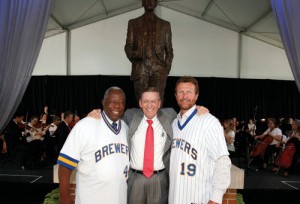
Bud Selig at the dedication ceremony for his statue
The path Kohl and the team are on now is very similar to the situation faced by his college roommate Bud Selig. In the early 2000’s the Brewers were struggling on the field and at the gate. Fans had tuned out the organization, and Selig had his own version of “long-time aides” involved in running the team in the form of daughter Wendy Selig-Prieb and son-in-law Laurel Prieb.
Like Kohl, Selig made an appeal for new minority investors to join the organization. He brought in Ulice Payne as the team’s new CEO and sent him out to sell potential investors on the advantages of joining the Brewers ownership structure as a shareholder. However the fact Selig was not selling controlling interest in the team caused prospective investors to stay on the sidelines. Payne and Selig quickly parted ways a year later.
After Selig’s realization that new investors would not buy in if they did not obtain operational control, Selig finally put the entire team up for sale. After perhaps wisely rebuffing an offer from Dan Gilbert, Selig settled on Mark Attanasio as the person that could lead the team into the new century and provide a strong cultural fit for the city of Milwaukee. The rest is history as the team has thrived under the ownership of Attanasio, while being competitive on the field most years and setting franchise attendance records.
With the passage of time and the successful transition to Attanasio, the record on Selig is now being re-written. Names such as Sal Bando, Marquis Grissom, Dean Taylor, and “Wendy and Laurel” that got bandied about endlessly on talk radio are long forgotten. While Selig wasn’t necessarily strong as the day-to-day owner of the Brewers, no one remembers any of that. Instead, he’s known as the man that got Miller Park built and ensured that baseball remain in Milwaukee. For that he’s earned his well deserved statue outside Miller Park.
Ironically Senator Kohl is now in the exact same position as Selig was a decade ago. That is a position to transition ownership to a new entity that will allow a fresh start, while at the same time securing a new arena for the City of Milwaukee. The political winds right now are blowing against any public money for a new facility. In contrast to his mayoral counterpart in Sacramento, Kevin Johnson, Mayor Barrett has been AWOL on the arena issue. Meanwhile Governor Walker and the GOP legislature in Madison are not willing to even discuss any political support for a new arena in an election year, if ever. All of which means this is going to fall entirely on Kohl to assemble a supportable plan and sell it to the community and politicians.
For Bucks fans the stars are possibly aligning for a very bright Bucks future here in Milwaukee;
In part from a long-term stability standpoint with a new owner and arena, and partly from the competitive standpoint with a top draft pick awaiting in 2014. But as it has been since he bought the team, it is all on Senator Kohl. The Buck(s) stops with him, which is the way he’s always wanted it. Kohl must now play his own version of Bud Selig and propel the franchise forward into a new era. The window is open for an enduring civic legacy, and as Bucks fans we hold out hope that he can succeed in achieving it.

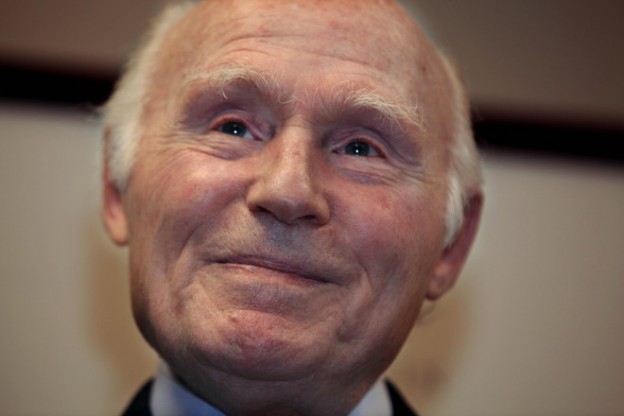
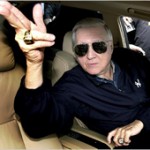
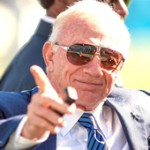
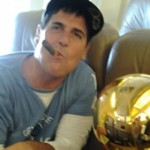
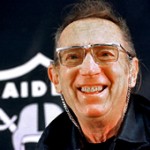
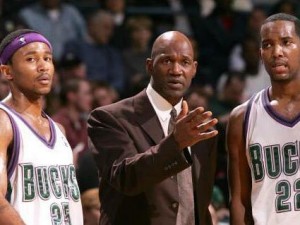
It’s weird, we always think more now that it’s the Bucks organization instead of the Bucks team. Well this misorganization is the reason why we haven’t had winning seasons over an extended period. I think Herb’s business and history in politics was always a bad mix with a sports franchise. For some one who is Harvard educated, if you’re not good at something you learn from mistakes and stick with what you ARE good at. Kohl just doesn’t know he’s bad at making basketball decisions, and this toilet flush season falls on his shoulders. Go do something else now.
Unfortunately it’s too late, a tipping point has been reached and the general public not only doesn’t care about the bucks, they actually dislike them and most want them to move. There is no recovering from that and we have Kohl and the people he surrounds himself with to thank. I actually love the Bucks and grew up with them in the 1980s but after 3 decades of complete and utter failure there may not be a way to save this franchise.
Mister Kohl please sell the team. While you do honestly want the best for the franchise, you’re the problem. You have no business being in this business.
A bit harsh for our taste Michael but we take your point.
Ilyasova plays European-soft and will never be a star in this league. But God bless Herb Kohl. Like the article says, he’s essentially failed as the Bucks’ owner but has the franchise’s and Milwaukee’s best interests at heart. It really is time for him to step aside just as Selig did.